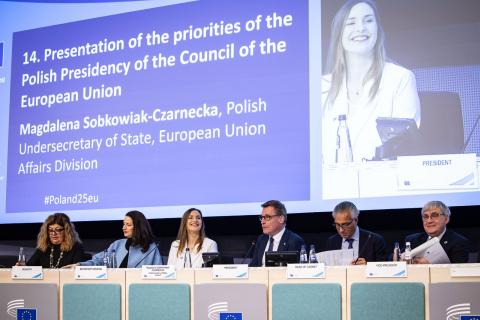European Economic
and Social Committee
Polish EU Presidency priority: strengthening European security and keeping Europe united
At its February plenary session, the European Economic and Social Committee (EESC) hosted a debate on the political priorities of the current presidency of the Council of the European Union, which started in January and will continue until June 2025.
The main task of the Polish Presidency will be to keep Europe united, move forward and take rapid decisions, said Magdalena Sobkowiak-Czarnecka, Polish Undersecretary of State for European Union Affairs, at the EESC plenary session on 27 February 2025.
Referring to the EU’s external security and, in particular, to the war of aggression against Ukraine, she said: ‘security is the biggest need of all Europeans and it can mean something different depending on where you are in Europe. Our objective is to keep the help to Ukraine going and maintain unity inside the EU.’
She mentioned, as one of the first few achievements of the Polish Presidency, the 16th package of sanctions against Russia adopted just a few days ago, and pointed out that future EU enlargement should be merit-based, with the same rules for all candidate countries. She also declared that a compromise on increasing EU defence funding should be found now, without waiting for the new multiannual financial framework.
EESC President, Oliver Röpke, stressed that Poland was taking over the rotating EU presidency at a time beset by difficult challenges such as geopolitical tensions and energy crises: ‘today’s debate has reaffirmed the critical importance of stability, resilience and unity in shaping the future of the European Union. The Polish Presidency’s priorities align closely with our collective ambitions, particularly in fostering a multi-dimensional approach to security. At a time of global uncertainty, our commitment to decisive and cooperative action remains unwavering. I thank all participants for their valuable contributions to this essential discussion.’
The political direction of the Polish EU Presidency and cooperation with the EESC
To address Europe’s most pressing issues, Poland will lead a presidency which follows an inclusive approach and combines, on the one hand, environmental and climate goals and, on the other, economic competitiveness.
Following the slogan ‘Security, Europe!’, the Polish EU Presidency will work on seven dimensions of security – external, internal, economic, food, energy, health and information:
- External and Military Security – addressing the ongoing war in Ukraine, financing the ‘East Shield’ and fostering a robust European defence industry.
- Internal Security – managing rapid response to natural disasters and how to organise aid, in cooperation with NGOs.
- Economic Security – reforming the EU’s multiannual financial framework, increasing the availability of European funds for beneficiaries and strengthening cohesion policy under the slogan ‘more power to regions, less power to Brussels’.
- Food and Climate Security – bridging the gap between agriculture and climate activism, with a commitment to competitiveness and a practical climate framework.
- Energy Security – reducing reliance on external energy sources, accelerating the energy transition with European-led technologies and lowering energy costs.
- Health Security – strengthening EU independence in medicine production and addressing mental health challenges, especially among children and young people.
- Information Security – combating disinformation, improving cybersecurity and managing the impact of virtual reality on mental health, particularly for younger generations.
In the past few past months, the cooperation between the Committee and the Polish Presidency has been strong and productive. The EESC has drawn up 15 exploratory opinions, which have already been adopted or will be soon.
The contribution of organised civil society is vital to shaping policies on important matters such as resilience, innovation and competitiveness, and the EESC is proud to play its part in the European venture, ensuring that everyone can benefit from the crucial goal of common prosperity.
The views of civil society representatives
During the debate, Stefano Mallia, President of the EESC’s Employers’ Group, stated: ‘we welcome the new focus on simplification. Reducing administrative burdens on businesses can save us EUR 37 billion that can drive productivity and create more resilient businesses and long-term economic stability. Europe needs the political courage to take all the actions it talks about.’
Reminding the audience about the importance of investing in human capital, EESC member Mateusz Szymański, representing the EESC’s Workers’ Group, highlighted that ‘artificial intelligence and digitalisation should be harnessed for the benefit of all. Yet, we see very few legislative proposals related to labour. Deregulation at any cost is not an option.’
On behalf of the EESC’s Civil Society Organisations’ Group, EESC member Justyna Kalina Ochędzan, said: ‘“Security, Europe!” We should all keep this motto in mind, because we are currently witnessing history being written and we have a war right next to us. Security has many faces, not just military, but also social, economic and energy.’
Downloads
-
Polish EU Presidency priority: strengthening European security and keeping Europe united
